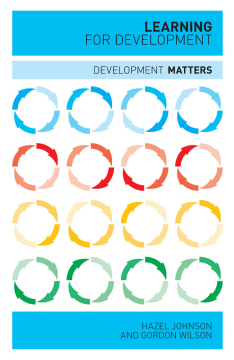
Additional Information
Book Details
Abstract
The organizational and institutional embedding of new learning is one of the biggest challenges for development. This book in the Development Matters series takes a learning approach to development, focusing the learning that takes place through development action – be it intentional and structured, or the outcome of different forms of engagement. Learning for Development also demonstrates how important a critical awareness of the social dynamics of learning is for individuals and their organizations, and for building coherent policy and action. Through a number of case-studies and a wealth of interdisciplinary research, Learning for Development proposes a more flexible model of development action which aims to ensure that projects address the specific needs of, improves dialogue between, local groups and individuals.
Hazel Johnson is Professor of Development Policy at the Open University, UK. Gordon Wilson is Senior Lecturer in Technology and Development, also at the Open University, UK.
'I commend Johnson and Wilson for this excellent book in which they reflect on the role that learning can play in development. It deals with complex issues in a style that is both considered and clear; critical and committed. It should be required reading for those who unreflectively do development'
Simon McGrath, Nottingham
'Learning for Development is an exciting read for anyone working in the field, provoking thought by providing real case studies around 'development action'. It focuses on intentional development which is referred to in the book as development action, arguing that the actions of interveners are fundamentally part of and contribute to, development history. It looks at the context in which learning occurs as well as learning as a social process. The concept of "action learning space" can help identify the dynamics in communities through which learning has the potential to occur. Trust and communicative action are key ingredients of shared learning. The book shares practical examples of successes and challenges from which one can learn and then adapt to one’s own work. It is a “must read” for anyone interested in development.'
Charlene Hewat, CEO, Environment Africa
Table of Contents
| Section Title | Page | Action | Price |
|---|---|---|---|
| About the s\reries | About the authors | ii | ||
| Acknowledgements | vi | ||
| 1 | Why Learning for Development? | 1 | ||
| Conceptualizing a learning approach to development | 1 | ||
| The scope of learning for development | 7 | ||
| The structure of this book | 11 | ||
| Notes | 12 | ||
| 2 | Approaches to Learning for Development | 13 | ||
| Learning and participation | 15 | ||
| Sharing knowledge | 17 | ||
| Learning through reflection and communication within a framework of truth | 18 | ||
| The three interests of knowledge | 21 | ||
| Instrumental vs communicative rationality | 23 | ||
| Lifeworlds | 25 | ||
| Empowerment | 27 | ||
| Theories of learning | 33 | ||
| Action learning spaces | 41 | ||
| Notes | 43 | ||
| 3 | Contestation and Learning between Multiple Stakeholders | 44 | ||
| Some concepts | 46 | ||
| Action learning spaces, social difference and communities of practice | 50 | ||
| Creating space for action learning and inclusive agenda setting | 52 | ||
| Composition of the workshop groups andfacilitators | 56 | ||
| Conclusions | 62 | ||
| Notes | 64 | ||
| 4 | Joint Learning through Similarity, Difference and Mutuality: North–South municipal partnerships | 65 | ||
| A tale of two partnerships: Kampala City Council and Kirklees Metropolitan Council; Iganga Town Council and Daventry District Council | 66 | ||
| Common mindsets: a necessary but insufficient basis for joint learning? | 70 | ||
| Difference and learning | 72 | ||
| Incentives and disincentives | 75 | ||
| Individual and organizational learning | 78 | ||
| Making the connections | 80 | ||
| Conclusion | 86 | ||
| Note | 86 | ||
| 5 | Changing the Self and Changing the Organization: doing things better and doing them differently | 87 | ||
| Conceptualizing the terrain | 89 | ||
| Formal learning and action learning | 92 | ||
| Doing things better (and differently?): individual learning experiences | 94 | ||
| Challenges to doing things differently and toinstitutionalization | 98 | ||
| The reflective thinker and learner | 102 | ||
| Conclusions: from reflective practitioner to agentof change? | 104 | ||
| Note | 106 | ||
| 6 | The Challenges of Learning through Computer-mediated Communication | 107 | ||
| Learning spaces using online communication | 110 | ||
| The pilot experience | 113 | ||
| Reflections | 122 | ||
| Notes | 124 | ||
| 7 | The Whys and Wherefores of Learning for Development | 126 | ||
| How and why learning occurs | 126 | ||
| How to promote learning | 131 | ||
| Learning for what purpose? | 134 | ||
| Action learning spaces, and the whys and wherefores of development | 135 | ||
| Note | 136 | ||
| Bibliography | 137 | ||
| Index | 146 |
